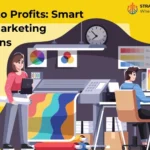ADDITIONAL QUESTIONS
Questions You Want To Know
What is Digital Marketing?
What Services does a Digital Marketing Agency Offer?
* Website Development – We ensure your online site is filled with details, has engaging content, and has a strong branding design.
* Branding – From the color scheme to the logo design, we make sure your brand engages and interests your clients to purchase your products over your competitors.
* Search Engine Optimization – Our experts take the necessary measures to secure a better ranking on the search engines. We maintain a content-rich online site that has fully-optimized web pages, social shares, and inbound links.
* Google Ads – Google’s PPC ads are highly flexible, fast, and a measurable way to advertise, which can help in achieving an instant increase in the online traffic of the website.
* Social Media Engagement – We work to improve brand recognition and awareness by sharing informative and meaningful details on social media platforms.
Why is digital marketing essential for my business?
Digital marketing is vital because it allows businesses to reach a larger audience, often more cost-effectively than traditional marketing methods. It enables personalized targeting, provides measurable results, and fosters direct interaction with customers.
How can SEO help my business grow?
SEO helps improve your website’s visibility in search engines. By optimizing your website with relevant keywords, high-quality content, and a user-friendly design, you can attract more organic (non-paid) traffic, which can lead to increased customer engagement and conversions.
What is content marketing, and why is it important?
Content marketing involves creating and sharing valuable content to attract and retain a clearly-defined audience, ultimately leading to profitable customer action. It’s essential as it builds trust with your audience, enhances your SEO efforts, and establishes your brand as an industry expert.
How can social media marketing benefit my business?
Social media marketing can increase brand awareness, improve customer engagement, and drive traffic to your website. It allows you to connect directly with your audience, understand their needs, and foster a community around your brand.
What is email marketing, and how can it be effective?
Email marketing involves sending emails to prospects and customers to build relationships, encourage customer loyalty, and increase sales. When executed correctly, it offers one of the highest returns on investment (ROI) among digital marketing methods.
How do I measure the success of my digital marketing efforts?
The success of digital marketing can be measured through various metrics like website traffic, click-through rates, conversion rates, social media engagement, and ROI. Tools like Google Analytics and social media analytics provide valuable insights into your campaigns’ performance.
Can a small business benefit from digital marketing?
Absolutely. Digital marketing offers a cost-effective way for small businesses to reach their target audience, compete with larger companies, and grow their customer base.
What is a marketing funnel?
A marketing funnel is a model that illustrates the theoretical customer journey towards the purchase of a product or service. It typically starts with “Awareness,” followed by “Interest,” “Decision,” and ends with “Action.”
How long does it take to see results from a digital marketing campaign?
The timeframe varies depending on the specific goals, strategies used, and the nature of your business. While some strategies like PPC can deliver quick results, others like SEO and content marketing are long-term strategies and may take months to show significant results.
What is Search Engine Optimization (SEO)?
SEO is a strategy used to increase the visibility and ranking of a website in search engine results pages (SERPs). It involves optimizing website content and design to make it more attractive to search engines, thereby improving organic or non-paid traffic to the website.
Why is SEO important for my business?
What is the Difference Between Off-Page and On-Page SEO?
What is Local SEO?
How long does it take to see results from SEO?
What is the difference between on-page and off-page SEO?
On-page SEO refers to optimizing individual pages on your website to rank higher in search results. This involves content creation, keyword optimization, and improving technical aspects like meta tags. Off-page SEO, on the other hand, involves activities that drive awareness and link equity towards your website from external sites, like link building and social media marketing.
What are keywords and why are they important in SEO?
Keywords are words or phrases that internet users type into search engines when looking for information. They are essential in SEO because they help search engines understand the content on your website, and thus, determine when to display your site in search results. Optimizing your website with relevant and valuable keywords can enhance your visibility to your target audience.
What is local SEO and how does it differ from general SEO?
Local SEO is a strategy aimed at making your business visible for geographically-related searches. It is particularly important for businesses with physical locations or those serving a specific geographic area. While general SEO focuses on ranking your website globally, local SEO prioritizes appearing on SERPs in a specific location.
Can I do SEO for my website myself or should I hire a professional?
While it’s possible to learn basic SEO techniques and apply them yourself, SEO is a complex field that requires deep knowledge and constant learning due to its ever-changing nature. Hiring a professional ensures you’ll get the most out of your SEO strategy while allowing you to focus on other aspects of your business.
How does mobile SEO differ from desktop SEO?
Mobile SEO involves optimizing your website for a better user experience on mobile devices. Given that more internet users are now browsing via mobile devices than desktop computers, mobile SEO has become essential. It involves aspects like ensuring your website is responsive (i.e., it adjusts to fit different screen sizes), improves site speed, and designs content for a “mobile-first” experience.
How does Google's algorithm impact my website's SEO?
Google’s algorithm determines how websites are ranked in its search results. It takes into account over 200 factors, including website relevance, usability, and authority, to provide the most relevant results for each search query. As Google frequently updates its algorithm, staying abreast of these changes and adjusting your SEO strategy accordingly is crucial to maintain or improve your website’s ranking.
How does PPC advertising work?
Pay-Per-Click (PPC) advertising is a type of digital advertising in which advertisers pay a fee each time their ad is clicked. You place bids on keywords that are relevant to your target audience. Your ad may appear when a user searches these keywords. You must pay a fee if you click.
How does PPC advertising work?
PPC advertising works on a bidding system. Advertisers bid for ad placement in a search engine’s sponsored links for keywords related to their business. When a user searches the keyword, the PPC ad may appear in their search results. If the user clicks on the ad, the advertiser is charged a small fee.
What are the benefits of PPC advertising?
PPC advertising can offer immediate visibility on search engines, precise targeting, measurable ROI, budget control, and an opportunity to outrank competitors. It also enables businesses to reach users who are actively searching for related products or services, leading to higher conversion rates.
Is PPC advertising suitable for all businesses?
PPC advertising can be suitable for almost all types of businesses, whether small, medium, or large. It’s especially beneficial for businesses aiming for quick, measurable results and those targeting specific demographics or regions. However, it’s important to manage PPC campaigns effectively to ensure a good return on investment.
How Often Should I Update My Web Content?
What's the difference between SEO and PPC?
SEO (Search Engine Optimization) and PPC are both digital marketing strategies aimed at increasing website visibility in search engine results. The main difference is that traffic coming from SEO is organic (free), while traffic generated from PPC is paid. SEO requires time and consistent effort to improve rankings, while PPC can provide immediate results.
How do I decide my budget for PPC advertising?
Deciding a budget for PPC advertising depends on various factors such as your business goals, industry, competitiveness of keywords, and overall digital marketing budget. Initially, it’s advisable to start with a smaller budget and then increase it based on the return on investment and business growth.
How can I measure the success of my PPC campaigns?
Success in PPC campaigns can be measured using various metrics such as Click-Through Rate (CTR), Quality Score, Cost per Conversion, Conversion Rate, and Return on Ad Spend (ROAS). It’s also important to evaluate how these metrics align with your overall business goals.
Can I manage my own PPC campaigns?
Yes, you can manage your own PPC campaigns. However, it requires a good understanding of the PPC platform, keyword research, bidding strategies, and ad creation. Many businesses choose to hire a PPC agency or specialist to handle their campaigns for better results and return on investment.
What are negative keywords in PPC?
Negative keywords are words or phrases you don’t want your ad to show for. By adding negative keywords to your PPC campaigns, you can prevent your ads from appearing on irrelevant or less profitable searches, thereby saving your budget for more qualified clicks.
Can I target specific demographics or locations with my PPC ads?
Yes, PPC platforms allow for advanced targeting options. You can target specific demographics (age, gender, interests), locations (country, state, city), devices (desktop, mobile), and even schedule your ads to appear at specific times. This helps ensure that your ads reach your ideal audience.
What is Social Media Marketing (SMM)?
Social Media Marketing (SMM) is a branch of digital marketing that utilizes various social media platforms to connect with your audience. This involves sharing content, engaging with followers, running advertisements, and driving audience growth. It helps to increase brand exposure and broaden customer reach.
Why is Social Media Marketing crucial for my business?
SMM is crucial for businesses today as it helps increase brand recognition, improve brand loyalty, and can even boost your SEO rankings. It also allows you to directly engage with your customers, providing insights into their needs and improving customer satisfaction.
Can Digital Marketing Improve Online Sales?
How Long Does It Take to See the Results When It Comes to Digital Marketing?
What is the Difference between Digital Advertising and Digital Marketing?
Why Should I use Analytics to Track My Website Metrics?
Is It Okay to Re-Purpose Content?
Why is PPC Important for Your Business?
What Does Responsive Mean?
What Makes a Good Website Design?
CONTACT US NOW
Haven’t Found Your Answer Just Yet?
Just Ask Us!
The FAQs didn’t answer to the query you have? Reach out to our customer support executives. We are always ready to help you out with your questions. Simply fill up the form below and we will get back to you.




